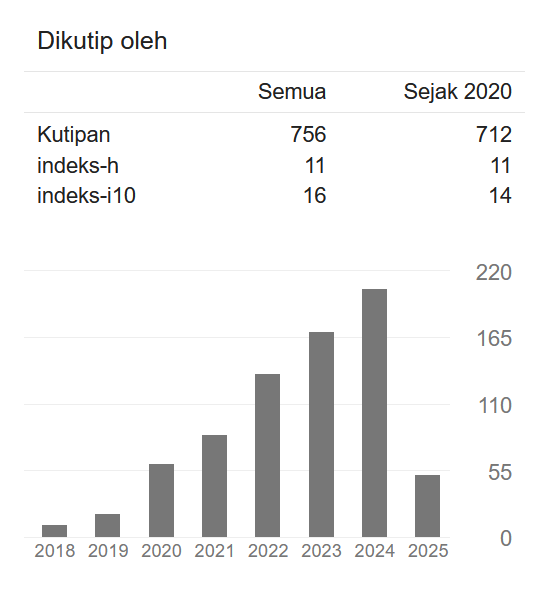The Status of Children Outside of Marriage and Its Relevance to the Reform of Islamic Family Law in Indonesia
DOI:
https://doi.org/10.19109/medinate.v20i1.23216Keywords:
Status, Children, Marriage, Relevance, Family LawAbstract
This research discusses the Status of Children Outside of Marriage and its Relevance to the Renewal of Islamic Family Law in Indonesia. This research aims to find out specifically how the status of children outside of marriage and its relevance to the reform of Islamic Family Law in Indonesia. The method used in this research is the method of collecting data through library research. Data is collected by collecting information from various sources of literature, such as books, journals, magazines, and so on. From this research, it can be concluded that the scholars agree that children born out of wedlock have family ties both with the mother and her family. This is also the case in the laws and regulations governing marriage law in Indonesia which stipulate that the only civil relationship of children born out of wedlock is with the mother and her family. Nevertheless, the plaintiff permitted the Constitutional Court to conduct a judicial review, especially to ensure that her child was given permanent legal status and accepted by the defendant's family. After the respondent disputed the existence of the child and ignored the child's civil rights, including payment of monthly living expenses and school fees, the plaintiff was forced to take legal action. Thus, the Constitutional Court decided to partially grant the petitioners' claims based on the reasoning of the Panel of Judges. It was an extraordinary ijtihad when the Constitutional Court issued a new ruling on the status of children born out of wedlock. The Constitutional Court's decision is supported by arguments that are in the public interest (al-mashlahah al-'ammah), including protecting the future of children and providing a deterrent effect on men who have free sex so that adultery does not become commonplace. At least today, we can observe that legal progress in Indonesia also considers vulnerable groups, especially children.
References
Abdurrahman, K. H. I. di I., & in Indonesia, K. H. I. (2007). Jakarta: CV. Akademika Pressindo.
al-Asqalany, I. H., & al-Asqalani, I. H. (1991). Fath al-Barry, juz XII. Beirut: Dar Al-Fikr, t. Th
Al-Mufarraj, S. (2003). Provision for Marriage: Laws, Traditions, Wisdom, Stories, Poems, Wills, Pearls. Jakarta: Qisthi Press.
Al-Syatibi, A. I. (2003). al-Muwafaqat fi Ushul al-Syari’ah. Vol. II (Beirut: Dar Al Kutub Al Ilmiyah, Tt), 1, 290.
Al-Zuhaili, W. (1997). Al-Fiqh al-Islāmῑ Wa Adillatuhu. Cet. Ke-2. Beirut: Dar Al-Fikr.
Alam, S., & Fauzan, M. (2008). The law of child adoption from an Islamic perspective. Kencana Prenada Media Group.
Ardine. (n.d.). Expert: Constitutional Court Decision Regarding Children Outside of Marriage Approaches the Rules of the Civil Code Source: http://www.dakwatuna.com/2012/02/18/18766/pakar-putusan-mk-terkait-anak-di-luar-nikah-dekati-aturan-kuh-perdata/#ixzz8cqXOJBwy Follow us: @dakwatuna on Twitter dakwatunacom o. https://www.dakwatuna.com/2012/02/18/18766/pakar-putusan-mk-terkait-anak-di-luar-nikah-dekati-aturan-kuh-perdata/#axzz8cqX2ddJ9:
Az-Zuhaili, W. (2016). Al-Munir, Tafsir Aqidah, Syari’ah Manhaj. Gema Insani.
bin Ahmad, A. al-W. M., & Rusyd, I. (1995). Bidayat al-Mujtahid wa Nihayat al-Muqtasid, juz. 1. Beirut: Dar Al-Fikr.
Djalaluddin, M. (2015). The Thought of Abu Ishaq Al-Syatibi in the Book of Al-Muwafaqat. Al Daulah: Journal of Criminal Law and State Administration 4(2), 289–300.
Faizin, Z. (2016). Study of MUI fatwa No. 11 of 2012 concerning the position of adulterated children and their treatment from the perspective of Indonesian legislation. STAIN Ponorogo.
Fatwa MUI No 11 of 2012 on the Position of Zina's Children and Their Treatment (n.d.).
Gunawan, E. (2016). The Role of Religious Courts in Islamic Law Reform in Indonesia. Syariah, 16, 77–86.
Hum, M., Manan, H. A., & IP, S. (2022). Various issues of Islamic civil law in Indonesia. Prenada Media.
Islam, D. R. E. H. (1997). Encyclopedia of Islamic Law. Jakarta: PT. Ichtiar Van Hoeve.
Mardani. (2011). Islamic marriage law in the modern Islamic world. Graha Ilmu.
Moh. Idris Romulyo. (2002). Islamic Marriage Law: Study of Analysis of Law No. 1 of 1974 and Compilation of Islamic Law, Bumi Aksara.
Mujieb, M. A. (2010). Dictionary of Fiqh Terms, Jakarta: Pustaka Firdaus, Cet. Ke 4 2010.
Nugroho, I. Y., & Safiudin, A. (2021). Nasab of Children Outside of Marriage from the Perspective of Progressive Law and Maqāṣid Sharī'ah. AL-HUKAMA: The Indonesian Journal of Islamic Family Law, 11(2), 1–28.
Oktavia, L. (2011). Status of children out of wedlock in Islamic law and positive law in Indonesia. IAIN Syekh Nurjati Cirebon.
Prasetyo, A., Dwiyatmi, S. H., Alfret, D. A. P., & Alsabilla, F. P. (2023). The Position of Extra-marital Children in the Indonesian Legal System. Journal of Kertha Patrika, 45(3).
Qosim, S. (2022). Status of Children Outside of Marriage According to Islamic Law. IS, 6(3), 54–61.
Ramulyo, M. I. (2006). Marriage Law, Inheritance Law, Procedural Law of Religious Courts and Zakat According to Islamic Law.
Rosyad, S. (2017). Legal Status of Children Outside of Marriage in Islamic Law and its Implementation in the Development of Legislation in Indonesia (Study of the Constitutional Court Decision Number 46/PUU-VIII/2010). Journal of Islamic Law,15(1), 155–179.
Satrio, J. (2000). Family law on the position of children in law. Citra Aditya Bakti.
Shahih al-Bukhari. (n.d.). Juz 14, h213, (al-Maktabah al-Shamilah al-Isdar al-Thani/2.11 program.
Thaib, H. M. H., & Jauhari, I. (2004). Kapita Selekta Hukum Islam. Pustaka Bangsa Press.
Wulandari, S. R., Khosyi’ah, S., & Mukhlas, O. S. (2023). The Development of Family Law Thought about Children Outside of Legal Marriage. PELITA LAW JOURNAL,4(2), 181–195.
Zein, S. E. M., & Aripin, J. (2004). Problems of contemporary Islamic family law: jurisprudential analysis with ushuliyah approach. Faculty of Sharia and Law, Syarif Hidayatullah State Islamic University (UIN ….








